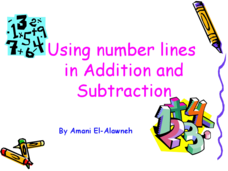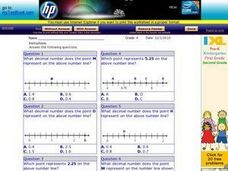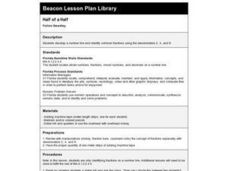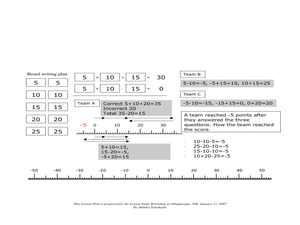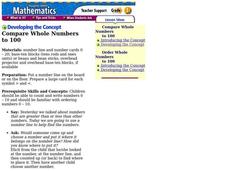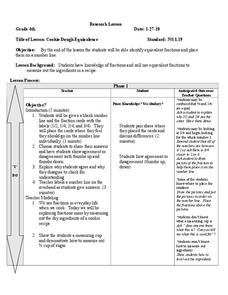Curated OER
Fractions and Number Lines
Upper graders figure out what fraction of the number line is pointed out. They complete seven problems.
Curated OER
Counting on to add
A cute little frog helps learners hop from number to number on the number line as they count on to add. They use the commutative property of addition to add the same numbers two different ways. A cute, simple, and potentially helpful...
Curated OER
Study Guide: Rational Numbers
In this rational numbers worksheet, students solve and complete 8 different problems that include applying the comparison property and density property for rational numbers. First, they replace each blank with the correct symbol to make...
Curated OER
Using Number lines in Addition and Subtraction
Adding and subtracting can be done by counting on or counting down a number line. This presentation provides a complete demonstration and examples of how one can use a number line to solve double-digit addition and subtraction problems....
Curated OER
Subtraction With Integers
This thorough introduction to the concept of subtracting negative integers walk learners through the necessary steps using teacher modeling and guided practice. Number lines and various word problems are used to support understanding of...
Curated OER
Absolute Value Bingo
Students explore some different concepts in relation to using a number line for instruction. Given some number values, they graph the position on the number line. The instructional activity ends with them playing Bingo.
Curated OER
Use Models to Compare and Order Integers
Students investigate the concept of integers and how they should occur in the realm of irrational numbers. The lesson includes the use of positive and negative integers. The lesson is a good foundation in order to move into calculating...
Curated OER
Decimals on the Number Line
In this number lines worksheet, learners choose which decimal point the letters represent on a number line, and what decimal number the letters represent. Students complete 10 multiple choice questions.
Curated OER
Positive & Negative Numbers
Young mathematicians solve and complete 22 different problems that include using a number line to evaluate. First, they define each of the terms listed. Then, pupils graph each integer on the given number line. They also evaluate each...
Curated OER
Highs and Lows
Plot data using the number line and discuss how negative numbers are used in math and science. Sixth and seventh graders share their graph with the class and provide an explanation for their plotting.
Curated OER
Positive and Negative Integers on a Number Line
Review the rules regarding positive and negative integers. While there are no instructions included in this resource, it could be used as a way to practice adding and subtracting integers. You could have learners use the resource as a...
Curated OER
Half of a Half
After your math classes have been introduced to fractions (especially those with denominators of two, four, and eight), introduce them to fractions on a number line with this lesson. Using a meter length of tape, show your class where...
Math Salamanders Ltd.
Fraction Number Lines 1 to 2
Now that your elementary schoolers have completed number lines from zero to one give them this review sheet! Seven number lines are shown here, fractions included. Consider having your mathematicians add two or three new points on each...
Math Salamanders Ltd.
Fraction Number Lines To 1: Answers
These number lines answer the worksheet entitled "Fraction Number Lines To 1." Or consider using this sheet as a review for your learners. You could use M&Ms to have learners illustrate each fraction on the number lines!
Curated OER
Locating and Ordering Equivalent Fractions on the Number Line
Elementary schoolers work to develop a deeper understanding of fractions. They use a handout about various gold pieces and attempt to divide them evenly. Then they watch a video clip that watched the CyberSquad solve the gold puzzle....
Curated OER
Number Lines and Fractions
Work with a number line to develop a deeper level of understanding for your young mathematicians. The six multiple-choice questions ask learners to identify where a fraction falls on the number line.
Curated OER
Addition: one and two digit numbers
Learners add one and two digit numbers together with the help of a number line. There are 18 problems to complete.
Curated OER
Playing Math Fever
Pupils complete activities to learn notation and uses for positive and negative numbers. For this number system lesson, learners play a game similar to Jeopardy to learn how to solve problems with positive and negative numbers.
Curated OER
Adding and Subtracting Integers
Middle schoolers use discs in order to add and subtract integers. There are manipulatives present so kinesthetic learners can access the curriculum. They also review the concept of the opposite of positive and negative numbers.
Curated OER
Compare Whole Numbers to 100
Young scholars practice comparing whole numbers. In this number comparison instructional activity, students use number lines, number cards, base-ten blocks, and bean sticks to practice comparing whole numbers that range to 100. Young...
Curated OER
Cookie Dough Equivalence
Who doesn't love cookies? In this lesson, learners follow a recipe to make cookies, practicing their ability to compare fractions as they go. This is a wonderful way to motivate your class to practice this important skill.
Ohio Department of Education
Fraction Models - Grade Three
Explore fractions using different manipulatives and illustrations. Your class can create a variety of models of fractions and mixed numbers with drawings and manipulatives. They then work to compare fractions, mixed numbers, and whole...
Curated OER
Adding By 4's
Why is skip counting important? By practicing skip counting, learners will be able to solve problems quicker. With this fill-in-the-blank worksheet, elementary math learners will practice counting by four.
Math Salamanders Ltd.
Finding a Half on a Number Line 1
Introduce your math class to fractions with this worksheet. Six number lines are provided, and learners must fill in the missing numbers. Some blanks are whole numbers, and some are half numbers. Numbers up to 48 are shown.





